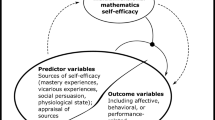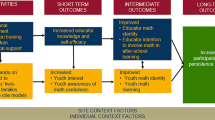Abstract
Internationally, associations between mathematics achievement and various beliefs and attitudes related to learning are well established. In this article, the findings of five studies are examined to identify patterns in New Zealand students’ mathematics-related beliefs and attitudes, and their relationships with achievement. Each study included an assessment of students’ beliefs and attitudes as well as their mathematics achievement, involved students in the 5 to 13-year-old range, and was reported in the 2009–2015 period. Students’ beliefs and attitudes were measured at various levels of specificity, ranging from beliefs about the malleability of intelligence, to confidence in their general mathematics ability, to task-specific mathematics self-efficacy judgments. It will be argued that using task-specific measures of students’ mathematics self-efficacy is of particular value for revealing a relationship between achievement and self-belief, and that teacher-implemented micro-interventions can be effective in strengthening both achievement and self-belief.
Similar content being viewed by others
Notes
A school’s decile is an indicator of the proportion of students a school draws from low socio-economic communities, with decile 1 schools having the highest proportion and decile 10, the lowest.
Units on the PAT: Mathematics scale are called patm units.
For a more detailed report of this study, see Bonne and Johnston (2016).
References
Anthony, G., & Walshaw, M. (2007). Effective pedagogy in mathematics/pāngarau: Best evidence synthesis iteration [BES]. Wellington: Ministry of Education.
Blackwell, L. S., Trzesniewski, K. H., & Dweck, C. S. (2007). Implicit theories of intelligence predict achievement across adolescent transition: A longitudinal study and an intervention. Child Development, 78(1), 246–263.
Bofah, E. A., & Hannula, M. S. (2015). TIMSS data in an African comparative perspective: Investigating the factors influencing achievement in mathematics and their psychometric properties. Large-scale Assessments in Education,. doi:10.1186/s40536-015-0014-y.
Bonne, L. (2012). The effects of primary students’ mathematics self-efficacy and beliefs about intelligence on their mathematics achievement: A mixed-methods intervention study. Unpublished PhD thesis, Victoria University of Wellington, Wellington, New Zealand.
Bonne, L., & Johnston, M. (2016). Students’ beliefs about themselves as mathematics learners. Thinking Skills and Creativity, 20, 17–28. doi:10.1016/j.tsc.2016.02.001.
Carmichael, C. & Hay, I. (2009). The development and validation of the students’ self-efficacy for statistical literacy scale. In R. Hunter, B. Bicknell, & T. Burgess (Eds.), Crossing divides: Proceedings of the 32nd annual conference of the Mathematics Research Group of Australasia (Vol. 1). Palmerston North, NZ: MERGA.
Caygill, R., & Kirkham, S. (2008). Mathematics: Trends in year 5 mathematics achievement 1994 to 2006. Wellington: Ministry of Education.
Caygill, R., Kirkham, S., & Marshall, N. (2013). Year 9 students’ mathematics achievement in 2010/11: New Zealand results from the Trends in International Mathematics and Science Study (TIMSS). Wellington: Ministry of Education.
Cury, F., Elliot, A. J., Da Fonseca, D., & Moller, A. C. (2006). The social-cognitive model of achievement motivation and the 2 × 2 achievement goal framework. Journal of Personality and Social Psychology, 90(4), 666–679.
Darr, C., Neill, A., & Stephanou, A. (2007). Progressive achievement test: Mathematics, 2nd edition. Teacher manual. Wellington: NZCER Press.
Dweck, C. S. (2000). Self-theories: Their role in motivation, personality, and development. New York: Psychology Press.
Educational Assessment Research Unit and New Zealand Council for Educational Research. (2015). National monitoring study of student achievement: Mathematics and statistics 2013. Wellington: Ministry of Education.
Ewers, C. A., & Wood, N. L. (1993). Sex and ability differences in children’s math self-efficacy and prediction accuracy. Learning and Individual Differences, 5(3), 259–267.
Ingram, N. (2015). Students’ relationships with mathematics: Affect and identity. In M. Marshman, V. Geiger, & A. Bennison (Eds.), Mathematics education in the margins (Proceedings of the 38th annual conference of the Mathematics Education Research Group of Australasia) (pp. 301–308). Sunshine Coast: MERGA.
Leder, G., & Forgasz, H. (2012). K-2 Make it Count students’ views of mathematic. In J. Dindyal, L. P. Cheng, & S. F. Ng (Eds.), Mathematics education: Expanding horizons (Proceedings of the 35th annual conference of the Mathematics Education Research Group of Australasia). Singapore: MERGA.
Lloyd, J. E. V., Walsh, J., & Yailagh, M. S. (2005). Sex differences in performance attributions, self-efficacy, and achievement in mathematics: If I’m so smart, why don’t I know it? Canadian Journal of Education, 28(3), 384–408.
Ministry of Education. (2007). The New Zealand curriculum. Wellington: Learning Media.
Neill, A., Fisher, J., & Dingle, R. (2010). Exploring mathematics interventions: Exploratory evaluation of the Accelerating Learning in Mathematics pilot study, report to the Ministry of Education. Wellington: New Zealand Council for Educational Research.
New Zealand Council for Educational Research. (2006). Progressive achievement test: Mathematics test 4. Wellington: NZCER.
Pajares, F. (1996). Self-efficacy beliefs in academic settings. Review of Educational Research, 66(4), 543–578.
Pajares, F., & Kranzler, J. (1995). Self-efficacy beliefs and general mental ability in mathematical problem-solving. Contemporary Educational Psychology, 20(4), 426–443.
Parish, L. (2015). Challenging the mindset of Sammy: A case study of a Grade 3 mathematically highly capable student. In M. Marshman, V. Geiger, & A. Bennison (Eds.), Mathematics education in the margins (Proceedings of the 38th annual conference of the Mathematics Education Research Group of Australasia) pp. 477–484. Sunshine Coast: MERGA.
Rubie-Davies, C. M., Peterson, E. R., Sibley, C. G., & Rosenthal, R. (2015). A teacher expectation intervention: Modelling the practices of high expectation teachers. Contemporary Educational Psychology, 40, 72–85.
Schunk, D. H., & Hanson, A. R. (1985). Peer models: Influence on children’s self-efficacy and achievement. Journal of Educational Psychology, 77, 313–322. doi:10.1037//0022-0663.77.3.313.
Siegle, D., & McCoach, D. B. (2007). Increasing student mathematics self-efficacy through teacher training. Journal of Advanced Academics, 18(2), 278–312.
Stipek, D., & Gralinski, J. H. (1996). Children’s beliefs about intelligence and school performance. Journal of Educational Psychology, 88(3), 397–407.
Stylianides, A. J., & Stylianides, G. J. (2013). Seeking research-grounded solutions to problems of practice: classroom-based interventions in mathematics education. ZDM, 45, 333–341. doi:10.1007/s11858-013-0501-y.
Thomas, G., & Tagg, A. (2009). The Numeracy Development Projects’ longitudinal study: How did the students perform in year 7? In Findings from the New Zealand Numeracy Development Projects 2008 (pp. 3–11). Wellington: Ministry of Education.
Young-Loveridge, J. (2010). A decade of reform in mathematics education: Results for 2009 and earlier years. In Ministry of Education, Findings from the New Zealand Numeracy Development Projects 2009, (pp. 15–35). Wellington: Learning Media.
Acknowledgments
Thank you to my colleagues at NZCER, especially Cathy Wylie for her helpful comments on this article, and Sue McDowall and Rachel Felgate for their feedback.
Author information
Authors and Affiliations
Corresponding author
Rights and permissions
About this article
Cite this article
Bonne, L. New Zealand Students’ Mathematics-Related Beliefs and Attitudes: Recent Evidence. NZ J Educ Stud 51, 69–82 (2016). https://doi.org/10.1007/s40841-016-0035-2
Received:
Accepted:
Published:
Issue Date:
DOI: https://doi.org/10.1007/s40841-016-0035-2




